MercoPress. South Atlantic News Agency
Sarkozy said Greece should have not joined the Euro in 2001: “it was not ready”
 Greek officials were furious with the French president’s statements
Greek officials were furious with the French president’s statements French President Nicolas Sarkozy has said allowing Greece into the Euro zone in 2001 was a “mistake”. He said Greece was “not ready” at the time, but he added, it could be rescued thanks to Wednesday's EU deal on the euro debt crisis
In response, Greece's foreign minister told the BBC that Athens was not the source of the crisis, and that no country should be made a scapegoat.
The agreement reached in Brussels has triggered a worldwide shares rally.
In a TV interview on Thursday, Sarkozy said admitting Greece to the Euro zone had been “a mistake” because the country had “entered with false [economic] figures. It was not ready”.
He added that he was confident the current Greek government would emerge from the crisis and that Wednesday's deal had averted a “catastrophe”.
“If Greece had defaulted, there would have been a domino effect carrying everyone away” Sarkozy said.
Speaking to the BBC, Greek Foreign Minister Stavros Lambrinidis said: “Greece is in the middle of the storm, but it is not the source of the problems of European debt and deficits.
”We see this with Portugal, Ireland, Spain and Italy. So it doesn't help to scapegoat a particular country when you're dealing with a European problem.”
The comments come after European leaders clinched a deal at marathon talks in Brussels. The main provisions are: banks holding Greek debt are to accept a 50%/60% loss; a new mechanism is to boost the Euro zone's main bailout fund to about 1tn Euros; banks must also raise more capital to guard against losses resulting from any future government defaults
The agreement is aimed at preventing the crisis from spreading to larger Euro zone economies, but the leaders said work still needed to be done.
US markets joined Europe's share rally. The Dow Jones index ended the day up 2.86%. London's 100 share index finished up 2.9%, France's Cac up 6% and Germany's Dax 5% higher.
The biggest gainers were banks, led by French institutions, which are the most exposed to Greek debt. Fears about the state of the Euro zone's finances and the threat of a break-up of the single European currency have been stalking markets for months.
The 50% debt write-off by banks means that Greece's debt burden could drop from 160% of GDP to 120% by 2020.
The banks will be required to raise about 106bn Euros in new capital by June 2012, and governments may have to step in, despite the unpopularity of further bank bail-outs.




Top Comments
Disclaimer & comment rulesCommenting for this story is now closed.
If you have a Facebook account, become a fan and comment on our Facebook Page!